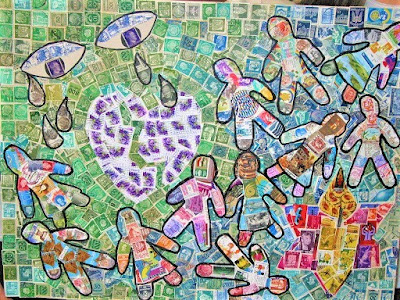Holocaust educators say mandatory education can make a difference
Related story
This story was written for the August 2021 edition of Jewish Rhode Island of
Providence:
Holocaust education can play a major role in making both students and adults
more aware of the Holocaust, say two educators with experience in the field.
Paula Olivieri, the education coordinator of the
Sandra Bornstein Holocaust Education Center at the Jewish Community Center in
Providence, said the legislation passed recently by the Rhode Island General
Assembly to create a permanent commission to
promote and continually improve genocide and Holocaust education will go a long
way toward making more people aware of the Holocaust.
In an interview, she explained that “since 2016, a consortium formed of
interested parties representing the Holocaust, Armenian, African nations and
Southeast Asian genocides developed curriculum,” in conjunction with the
Department of Education, for teachers in grades 6-12 and put it on the
department’s website.
The problem with that approach, she said, was that “the consortium had no
official standing in the state (and) no way to enforce the (2016) law. We’re
hoping that the commission will be able to do that.”
Asked if she thinks Holocaust education can reduce anti-Semitic incidents in
schools similar to the one this spring at Duxbury High School in Massachusetts,
where the football team reportedly had been using “Auschwitz” as a term to call
football plays for several seasons, she said she’s optimistic that it can.
Olivieri
pointed to states such as New Jersey that already
mandate Holocaust education as proof that it works. She said in those
states “you find that students are more aware of the Holocaust and genocides.”
There are currently 18 states where Holocaust education
is required, and there will be 19 in 2022 when Arkansas’ law takes effect,
according to the United States Holocaust Memorial Museum.
Another educator, Charlotte Sheer, a retired teacher living in Plymouth, Mass.,
who founded the Holocaust Stamps Project at the Foxboro Regional Charter
School, knows that Holocaust education works, because she educated students
about the Holocaust on her own at a time when there were only five states
requiring it.
Massachusetts wasn’t one of them, but that didn’t stop Sheer from teaching her students
about it. She did that by first introducing her fifth-graders to the Holocaust in
2008 by reading the historical novel “Number the Stars” by Lois Lowry. The
book, “set in Nazi-occupied Denmark, led to remarkable conversations about
discrimination, bullying, and unfounded hatred, experiences not unfamiliar to
some in the class,” Sheer said.
“The supportive educational climate in my culturally diverse school allowed me
to undertake an ambitious learning activity which evolved into the Holocaust
Stamps Project, the collection of 11 million postage stamps, each honoring one
victim of prejudice and hate, 6 million Jews and 5 million from other non-Aryan
backgrounds,” she said.
The project was embraced by the entire school, she said.
“For 10, years, students in kindergarten through grade 12 worked together,
trimming and counting stamps, and creating 18 stamps collage artworks depicting
aspects of the Holocaust. Making children aware of the historical facts
opened the door to understanding how destructive prejudice can be,” she said.
Holocaust education is pivotal toward reducing anti-Semitism, she said, because
“today’s children are tomorrow’s parents --- and leaders. What is taught in
school today provides the foundation for how tomorrow’s adults will conduct
their lives and treat each other,” she said.
Recent remarks by adults using the Holocaust to make political points during
the pandemic show seem to support Sheer’s comments about why Holocaust education
is needed. Two recent incidents --- one national and one locally – illustrate
that point.
* Republican Georgia Congresswoman Marjorie Taylor Greene in May compared the
Nazi’s persecution and murder of 6 million Jews to people being urged or
mandated to wear masks during the pandemic, and-or being asked for their
COVID-19 vaccination status.
* In July, a Dighton-Rehoboth Regional School Committee member,
Katie Ferreira-Aubin of Rehoboth, in social media posts, compared requiring
vaccines and vaccine passports to the Holocaust, remarks she defended. “When
you explain things in that extreme, it does get people’s attention to kind of
say, ‘OK, maybe our freedoms are being taken away right now’. So, sometimes you
do have to use extremes to get attention. But I stand by it,” she told WJAR-TV
Channel 10 in Providence.
Both the Anti-Defamation League of New England and school Superintendent Anthony
Azar, strongly condemned her remarks.
“Comparing public safety measures such as vaccine passports to the #Holocaust
is disrespectful, ignorant and trivializes the memories of the 6 million.
Apologize and remove these posts Katie Ferreira-Aubin. Dighton-Rehoboth
deserves better,” the ADL said in a statement.
Azar told The Sun Chronicle of Attleboro that “it must be made clear that the
comments within the social media posts do not reflect the values and beliefs of
the Dighton-Rehoboth Regional School District. Our district strives for
inclusivity and sensitivity, As a former teacher who has taught about the
Holocaust, comparing vaccination requirements to the Holocaust is both
reprehensible and unfortunate.”
The educators hope that making Holocaust education mandatory will lead to a
reduction of such incidents.

Comments
Post a Comment